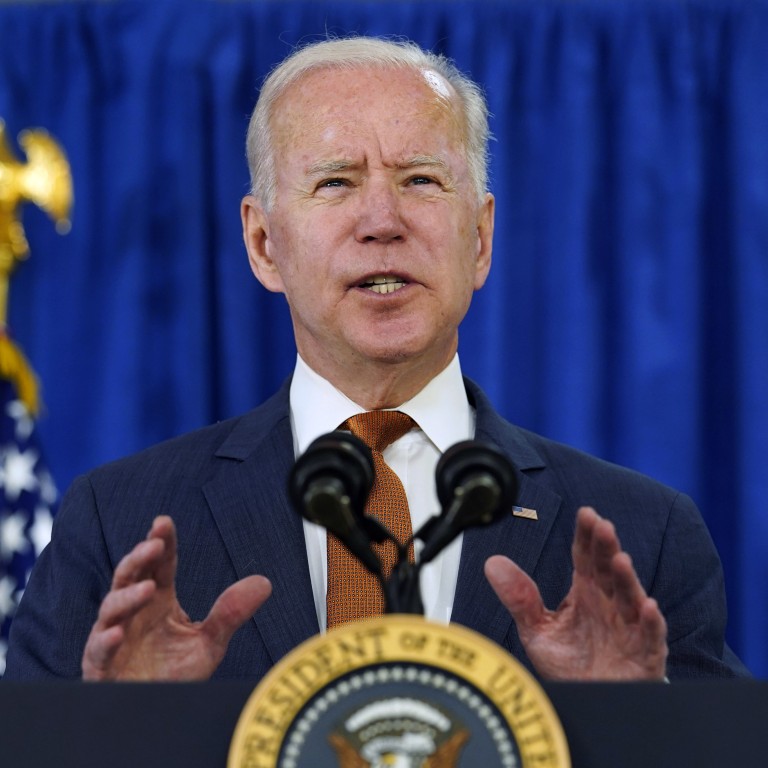
US optimism to reshore supply chains from Asia ‘overblown’, with region’s share of global exports set to rise
- Biden administration is keen to loosen supply chain dependence on Asia, especially China, and has established a trade ‘strike force’ to strengthen US production
- But The Economist Intelligence Unit says firms and investors will remain deterred by North America’s lack of competitiveness compared to Asian economies
Asia’s convenience, reliability and cost-effectiveness mean optimism and expectations in the United States that American companies can reshore production from the region is “overblown” and any such shifts will “remain an exception to the rule”, according to a new report.
But a report from the The Economist Intelligence Unit (EIU), released on Wednesday, said companies and investors will remain deterred by North America’s lack of competitiveness compared to Asian economies.
A number of obstacles will prevent businesses and investors from viewing North America as a realistic production substitute for Asia
It also said that lingering protectionism and cross-border tensions within North America will present another obstacle, complicating options for arbitraging production costs throughout the region, with these factors set to discourage the types of investment required to transform North America into a viable, self-sustaining supply-chain ecosystem.
“North America boasts several advantages – including years of economic integration, a large free-trade area, short travel times and new opportunities for policy coordination under [United States-Mexico-Canada Agreement],” said Andrew Viteritti, The EIU’s commerce and regulations lead.
“However, a number of obstacles will prevent businesses and investors from viewing North America as a realistic production substitute for Asia, at least through the medium term.”
The report noted that of particular relevance was Asia’s more successful mitigation of coronavirus disruptions to production and trade, as well as its established, reliable and low-cost manufacturing capabilities.
We forecast that Asia’s share of global exports will continue to rise in 2021-25
The USMCA includes tighter North American content rules for cars, new protections for intellectual property, prohibitions against currency manipulation and new rules on digital commerce that did not exist when Nafta launched in 1994, an agreement that former US president Trump lambasted as the “worst trade deal ever made”.
The EIU report referred to remaining rifts in the US-Canada relationship, including plans to double US tariffs on Canadian timber and potential exemptions to Biden’s new “Buy American” rules.
The Biden administration is also planning to sue Canada for allegedly failing to open up its dairy market as per requirements of the USMCA, the report added.
It also mentioned concerns over the rise of nationalist and statist policies in Mexico, which are compromising the country’s potential to serve as a cost-effective production hub for North America.
EU, US launch trade, technology council to outcompete China
“These factors will discourage the types of investment required to transform North America into a viable, self-sustaining supply-chain ecosystem. This will be particularly true of foreign investment, which will continue to favour Asia’s low-cost production hubs,” the report said.
“We forecast that Asia’s share of global exports will continue to rise in 2021-25, reflecting the region’s sustained importance in global supply-chain networks, while North America’s share will remain unchanged.”
According to The EIU report, North American Supply Chains: Will reshoring actually happen?, North America’s share of global exports by value will remain unchanged between 2019 and 2025 at 14 per cent. A slight increase in the share of US exports will be countered by decreases in the shares for Canada and Mexico.
Asia’s share of global exports will rise by 2 percentage points, to 38 per cent, with increases for both China and Southeast Asia, highlighting Asia’s durable significance in global supply chains.

.JPG?itok=J8tgfPmW&v=1659948715)
